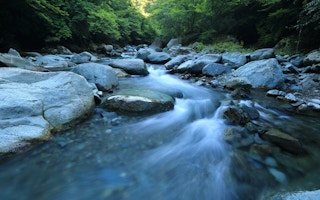Criss-crossed by over 3,000 rivers, Malaysia is a country that sources 98 per cent its water from streams and rivers. Despite this, 53 per cent of Malaysian rivers have been classified as at least slightly polluted, according to 2016 data published by the country’s Department of Environment.
To continue reading, subscribe to Eco‑Business.
There's something for everyone. We offer a range of subscription plans.
- Access our stories and receive our Insights Weekly newsletter with the free EB Member plan.
- Unlock unlimited access to our content and archive with EB Circle.
- Publish your content with EB Premium.
Protecting natural water sources and ensuring a steady supply of drinking water for Malaysians has therefore been a key priority of the SPARK Foundation, the corporate social responsibility arm of Heineken Malaysia, which last week announced it would be investing RM2.5 million into water conservation efforts.
Under the third phase of its Working Actively Through Education and Rehabilitation (W.A.T.E.R) project, SPARK Foundation will fund two key initiatives in the river basins of Sungei Way, Sungai Penchala and Sungai Selangor.
A continuation of its existing collaboration with local non-profit Global Environment Centre (GEC), the initiatives are aimed at raising awareness about the importance of rivers and water conservation. Under the ‘Water for Water’ project, a rainwater harvesting system will be set up in a residential unit with 1,800 residents in Petaling Jaya, Selangor. This project, set up in collaboration with the Petaling Jaya City Council (MBPJ), will help residents save 1 million litres of water annually.
Johary Bin Anuar, deputy mayor of MBPJ remarked in a statement: “Water conservation is a critical effort that must be managed effectively, especially in a highly urbanised and fast- growing city like Petaling Jaya.”
The project will also distribute water thimbles—which are water-saving devices—to 10 community representatives in Petaling Jaya to cut down domestic water wastage.
Secondly, the ‘Water for Quality’ projects of Heineken Malaysia’s Water Stewardship Agenda, also launched last week, will focus on reforesting and planting wetlands to improve the natural water filtration system at selected points in the north Selangor peat swamp forest and along the Penchala basin respectively.
Furthermore, the foundation is set to collaborate with government bodies like the Department of Irrigation and Drainage and the Department of Environment by launching public outreach programmes including the Sungai Penchala Open Classroom.
“The W.A.T.E.R Project has been a success due to smart partnership with government agencies and communities. With the renewed project direction, we will be able to introduce alternative water supply and strengthen awareness on water conservation to the general public,” remarked the GEC river care coordinator, K Kalithasan.
With the latest round of funding from SPARK, the total investment made into the W.A.T.E.R project amounts to RM10.5 million to date.
Renuka Indrarajah, director of corporate and legal affairs of Heineken Malaysia and trustee of SPARK Foundation, told Eco-Business: “Water conservation is a collective responsibility. Businesses should understand where their water comes from and take a proactive effort to embark on strategic projects, in collaboration with the right partners for measurable outcomes.”
Since its launch in 2007, the first phase of the initiative focused on improving the water quality of Sungei Way river and improving the biodiversity of local fauna. The second phase, which started in 2009, kick-started education and outreach programmes for communities living along Sungai Senam, tributaries of the Kinta river basin and the Sungao Penchala basin to teach them about river adoption and pollution mapping.
Water is not just a key ingredient in our products, it is the source of all life.
Renuka Indrarajah, director of corporate and legal affairs,Heineken Malaysia Berhad
“When we first started in 2007, we faced challenges in reaching out to the local communities as river conservation was new subject matter to them,” commented Indrarajah.
“But through consistent engagement to improve awareness on the issue, we eventually saw local communities taking ownership of the river agenda when they saw the potential of real changes in the environment, which helped improve their quality of life,” she added.
By the middle of this century, 88 per cent of people in Asia will be affected by water scarcity and although 99 per cent of Malaysians have access to clean drinking water currently, it may not remain so.
Indrarajah said climate change posed the biggest threat to Malaysia’s water security, but this could be an opportunity for businesses that work with water or use water as a resource.
She added: “We can create alternative water supply to leverage upon Malaysia’s tropical weather [for rainwater harvesting], and continue to educate Malaysians to appreciate our water resources.”










